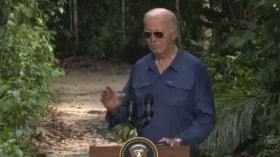Blue check blues: Twitter tricked into verifying teen’s fake 2020 candidate for Congress while real people languish

A high school student tricked Twitter into verifying an account he made for a fake candidate for Congress from Rhode Island, proving the platform’s vaunted election integrity efforts are no match for a bored teen.
Rhode Island Republican Andrew Walz’s Twitter has been suspended as of Friday, but before that, the blue-checked politician was seemingly a candidate like any other. Perhaps the platitudes that graced his page were a little emptier - “Let’s make a change in Washington together,” really? - and the follower count a bit low, but the coveted blue check bestowed by Twitter sometime in the past few weeks would likely have convinced the casual observer that “Walz” was a real person, and not a 17-year-old student living in New York state.
Also on rt.com ‘This should go well’: Trolling and worry as Twitter reveals plan to flag ‘lies & misinformation’The anonymous high-schooler told CNN he was able to game Twitter’s recently-expanded candidate verification system by relying on the implied endorsement of election-info clearinghouse Ballotpedia. In just under half an hour, he’d set up a website for “Walz” and a Twitter page, used an AI “person”-generating website to give his would-be Rhode Island congressman a face, and filled out some quick forms for Ballotpedia, Twitter’s partner since December in its expanded candidate verification efforts.
Neither site supposedly asked “Walz” for identification or proof he had actually filed to run for office. Ballotpedia editor in chief Geoff Pallay told CNN it’s typical for candidates to build a website and establish an online presence before they’ve necessarily filed election papers, insisting the site separates “officially filed” candidates from merely “declared” ones. That distinction somehow didn’t get passed on to Twitter - though it will going forward, Pallay assured the outlet.
Ballotpedia removed Walz’s page on Friday, replacing it with a contrite message that nevertheless manages to deflect responsibility from itself onto the high-schooler. The site claims it has updated its “declared candidate policy” and, presumably, learned a valuable lesson about trusting anyone who claims to be a politician.

CNN mostly focused on shaming Twitter over its failure to fact-check Ballotpedia, noting that the platform had failed to verify the accounts of several real politicians. As of Tuesday, some 90 primary candidates whose home states are set to vote on Tuesday had still not been verified, potentially presenting a major obstacle to seeking donations and - the one thing Twitter claims it doesn’t want to do - swaying election results.
Much like Facebook and YouTube, Twitter has made a show of presenting itself as an authoritative and trustworthy platform for information about the 2020 US elections, banning all political advertising in November and announcing a crackdown earlier this month on deepfakes and “synthetic or manipulated media likely to cause harm.”
This “election-integrity theater” is supposedly aimed at preventing a rerun of 2016, when a cavalcade of alleged “Russian bots” and “Kremlin trolls” supposedly conned a sizable chunk of the electorate into voting for US President Donald Trump. Time and again, however, such “reforms” have proven hollow, whether through the size of the loopholes they leave, uneven enforcement of their provisions, or - all too often - sheer incompetence. All the election integrity in the world doesn’t matter if the candidate you’re trying to elect doesn’t exist.
Like this story? Share it with a friend!












